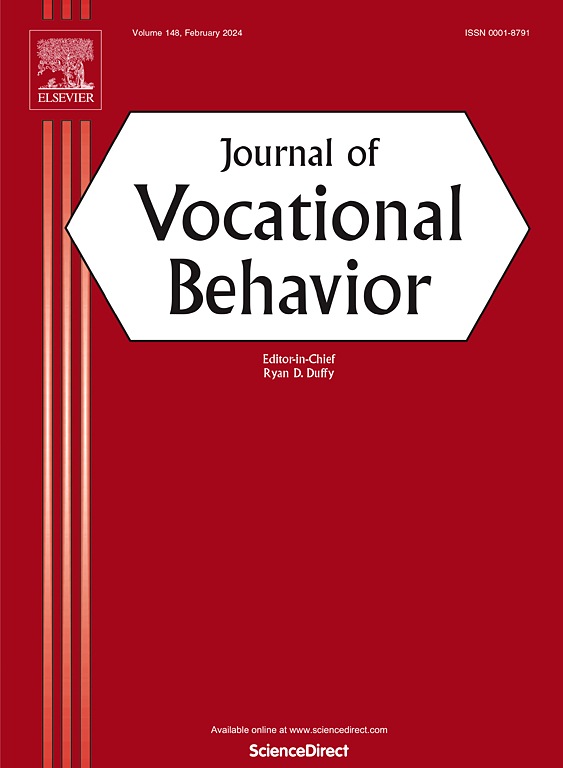Workplace impostor thoughts are positively associated with risk aversion: Implications for workplace deviance and creativity
IF 5.2
1区 心理学
Q1 PSYCHOLOGY, APPLIED
引用次数: 0
Abstract
The impostor phenomenon is a significant issue that may hinder contemporary workers' career development. How do people adjust their behaviors at work due to this unpleasant experience? In this study, we utilize conservation of resources theory to posit that entertaining workplace impostor thoughts is positively associated with risk aversion. This, in turn, has dual effects on organizations—decreasing workplace deviance while simultaneously impeding creativity. Additionally, we propose that competitive psychological climate moderates and strengthens the effects of workplace impostor thoughts on risk aversion, as well as the indirect effects of workplace impostor thoughts on workplace deviance and creativity via risk aversion, such that these relationships are stronger under conditions of a highly competitive psychological climate. Results from a time-lagged critical incident technique analysis and a multi-wave, multi-source field survey lend support to our theoretical framework and hypotheses. We discuss the theoretical and practical implications of these findings and outline future research directions.
工作场所冒名顶替者思想与风险厌恶正相关:对工作场所偏差和创造力的影响
冒名顶替现象是一个严重的问题,可能会阻碍当代工人的职业发展。由于这种不愉快的经历,人们如何调整他们在工作中的行为?在本研究中,我们利用资源保护理论假设娱乐工作场所冒名顶替者思想与风险厌恶呈正相关。这反过来又对组织产生了双重影响——减少了工作场所的偏差,同时阻碍了创造力。此外,我们提出竞争心理气候调节并加强了职场冒名顶替者思想对风险厌恶的影响,以及职场冒名顶替者思想通过风险厌恶对职场偏差和创造力的间接影响,因此在高度竞争的心理气候条件下,这些关系更强。时间滞后的关键事件技术分析和多波、多源实地调查的结果为我们的理论框架和假设提供了支持。我们讨论了这些发现的理论和实践意义,并概述了未来的研究方向。
本文章由计算机程序翻译,如有差异,请以英文原文为准。
求助全文
约1分钟内获得全文
求助全文
来源期刊

Journal of Vocational Behavior
PSYCHOLOGY, APPLIED-
CiteScore
13.10
自引率
5.40%
发文量
85
期刊介绍:
The Journal of Vocational Behavior publishes original empirical and theoretical articles offering unique insights into the realms of career choice, career development, and work adjustment across the lifespan. These contributions are not only valuable for academic exploration but also find applications in counseling and career development programs across diverse sectors such as colleges, universities, business, industry, government, and the military.
The primary focus of the journal centers on individual decision-making regarding work and careers, prioritizing investigations into personal career choices rather than organizational or employer-level variables. Example topics encompass a broad range, from initial career choices (e.g., choice of major, initial work or organization selection, organizational attraction) to the development of a career, work transitions, work-family management, and attitudes within the workplace (such as work commitment, multiple role management, and turnover).
 求助内容:
求助内容: 应助结果提醒方式:
应助结果提醒方式:


